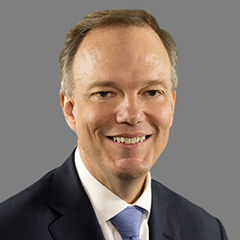Paul Decker
It’s now been 10 days since George Floyd’s senseless death at the hands of police officers sworn to protect the community they serve. And what’s unfolded over those 10 days across the nation has invoked a wave of emotions.
I’m saddened that the Black community, which was already suffering so much from the pandemic and economic distress, has now been forced to bear the weight of even more grief.
I’m outraged by yet another reminder of the systemic racism that pervades our social institutions and constrains opportunities for Black people in America.
I’m frustrated and angry that we as a nation are still unable to confront our history of social injustice and senseless violence towards Black Americans.
And I’m disappointed to be reminded how fragile progress can be.
But I’m resolute that Black Lives Matter.
And I’m hopeful that this moment of collective grief can be translated into collective action to overcome a subculture of fear and hate to create meaningful progress.
And that Mathematica can play a role in turning the raw emotions of protests into lasting impacts on public policies that improve well-being for all.
But being hopeful is not enough. I’m also listening.
Our institutions, including our workplaces and the research community, we don’t have a strong track record of truly listening to Black voices.
I’m committed to using my privilege to not only listen to black voices, but to amplify them.
Today, that means taking the time to listen to members of our Black Employee Resource Group and to heed the advice of Ralanda Nelson who heads up Mathematica’s diversity, equity, and inclusion efforts. I’m grateful that Ralanda is joining me to share her perspective and outline important next steps for Mathematica.
Ralanda Nelson
Thank you, Paul. As Mathematica’s diversity, equity and inclusion leader, I speak to you, relatively new to this organization, but not new to the fight for Black lives. This fight is a personal one for me. It lives in the lives of my family and it lives here at Mathematica.
For me, promoting diversity, equity, and inclusion is not about reacting to traumatic events that are the result of state-sanctioned violence. Indeed, our work cannot just be in reaction to acute crises and traumatic injustices. The work we are called to do involves seeing the chronic, ongoing oppression of black and brown bodies over 400 years in the making. Behind the brutality we have witnessed over the past several weeks—from Ahmaud Arbery to Breonna Taylor to George Floyd to Tony McDade—behind that violence is also the violence of unaffordable housing, of unequal education, and inadequate health care.
In these moments, the evidence is overwhelming. In these moments, hurt and pain is felt on individual and systemic levels. In these moments, the history of this country and the everyday persecution of a people seems insurmountable. But this moment gives us an opportunity to make institutional choices that signal our commitment to our mission of improving public well-being.
And our organization is committed to systematic DEI investments that enable us to prioritize the unlearning of racism, cissexism, and transphobia and the co-creation of a more just Mathematica. This work began before my tenure here and it is my privilege to ensure it remains an organizational priority along with our core values of collegiality, dignity, and respect. To our Black employees and partners, we see you and we are prioritizing your healing and your humanity.
Our hope is that this moment teaches us how we will become the Mathematica we want to be. Our hope is that this Mathematica will be comprised of people of all backgrounds, abilities, and experiences who feel they belong and are valued. And I am humbled to drive this organization toward a more diverse, inclusive, and equitable future.
Our mission won’t allow us to arrive at that future without our valued partners and allies. This moment isn’t only one of introspection, but also one where we will co-create what a more promising future looks like by listening intently with a bias toward justice and actions for our employees, partners, and allies.
This journey will be ongoing. It will be uncomfortable. It will be rewarding. And it is only possible when we make that progress together.



